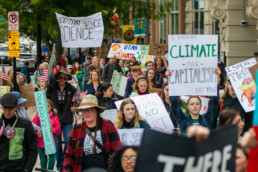Community Climate Resiliency Project
Year Complete: 2019
Grant Amount: $31,500
Local Government: City of Salt Lake City, UT
Local Foundation: George S. and Dolores Dore Eccles Foundation; Telemachus: Foundation to Empower the Poor and End War; The Community Foundation of Utah; The Richard K. and Shirley S. Hemingway Foundation
Project Purpose
To initiate inclusive engagement of low-income and minority Salt Lake City residents in efforts to mitigate climate change impacts, improve community resiliency, and ensure social equity.
Key Lessons Learned
Lessons learned about tools and tactics through the project that other sustainability directors could use to advance their work.
The project team was successful in reaching more households through the “Neighborhood Light Swap” than the initial target goals. However, demographic data from the pilot program showed that over 70% of the participants self-identified as Caucasian while close to 50% of the residents in the target zip codes are of Hispanic or Latinx decent. To more effectively reach communities of color and low-income residents, the city is implementing new strategies to partner directly with community organizations serving communities of color in the expanded “Empower SLC” program. This includes expanded collaboration and on-site light swap locations at Crossroads Urban Center’s HEAT offices and Utah Community Action’s west-side food pantry.
On a broader level, the project team witnessed a concerning trend from the local utility (as well as other utilities in the Southwest and Midwest) to back away from energy efficiency program investments. As such, the city is retooling the strategy for “Empower SLC” program expansion to ensure that those community members who can benefit from energy efficiency programs the most have greater access to these programs. Utah Clean Energy is also engaging in discussions with stakeholders, community leaders, and utilities to identify solutions that will help keep utility energy efficiency investments for low income community members robust in the future.
Lessons for developing a collaborative process between a local government sustainability director and local place-based foundation(s).
A key insight gained from this initiative is the challenge of fostering regular communication avenues between foundation representatives, sustainability directors, and the nonprofit program partner. Since foundation representatives are tight on time, they frequently prioritize their communication with nonprofit grant recipients directly. As such, our team ensured that Utah Clean Energy served as key facilitator of communication and program updates between all parties. For example, Utah Clean Energy provided an opportunity for Salt Lake City’s Sustainability Director to share information with local foundation representatives and community donors directly by hosting a small, informal funder gathering, which in turn, helped strengthen relationships between the various entities.
Additionally, the project team learned that sharing information about the role energy efficiency plays in advancing affordable housing is a message that resonates with local funders. Salt Lake City (like many cities across the nation) is facing an affordable housing crisis. Energy efficiency measures can significantly reduce a family’s monthly utility bills over a long-term period and allows additional financial resources to be directed toward mortgage payments, rent, or other household-related expenses. When local funders understand that energy efficiency is a significant (and long-term) opportunity to improve affordable housing and self-sufficiency, they are more eager to discuss and fund collaborations.
Additional Information and Resources
Learn more about Salt Lake City Sustainability Department’s continuing partnership with Utah Clean Energy to empower Salt Lake City residents with the tools to save energy and money while reducing pollution on a community-wide scale in the Empower SLC program.

